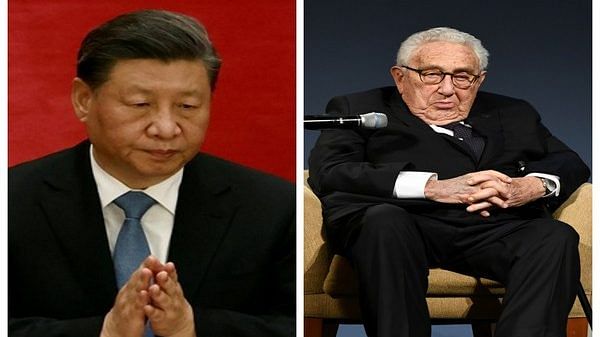Henry Kissinger meets Xi Jinping in Beijing, while John Kerry is rebuffed. Foreign direct investment into China is projected to fall to a new low of $20 billion in the first quarter. India rejects BYD’s $1 billion joint investment proposal. Chinascope looks at the lacklustre outcome of Kissinger’s Beijing trip – and much more.
China over the week
The mystery surrounding Chinese Foreign Minister Qin Gang’s disappearance doesn’t hinder the meeting between former US Secretary of State Henry Kissinger and President Xi Jinping.
According to US officials, Kissinger went to Beijing in personal capacity, allowing Beijing to signal its intentions regarding US-China relations.
During their sit-down, Kissinger expressed his honour at being hosted by Xi Jinping at Diaoyutai State Guesthouse’s building number five, where he first met Chinese leaders in 1971.
Xi tells Kissinger that the world is undergoing unprecedented changes, and both China and the United States are at a crossroads, facing crucial choices.
Xi’s admiration for Kissinger while rebuffing US climate envoy John Kerry signals China’s preference. Beijing wants the US to make the ‘choice’ of accommodation rather than containment of China’s rise in the international order.
Kissinger’s visit highlights Beijing’s inability to find support in Washington’s political beltway against the Joe Biden administration’s China agenda. The visit may appease Beijing’s nostalgia for a calmer period in their relationship, but it is unlikely to recreate that atmosphere.
During his stay in Beijing, Kissinger also met with Defence Minister Li Shangfu, whom even the US Defence Secretary Llyod Austin has failed to meet for a chat. Some speculate that Kissinger acted as a back channel for resuming military-to-military dialogue. The idea that Kissinger could magically charm Xi Jinping into resuming the dialogue seems like mere speculation. Kissinger’s visit primarily serves Beijing’s efforts to find friendly views at Zhongnanhai, while Xi uses Kissinger to send a message to the US.
The Chinese ambassador to the US, Xie Feng, had discussions with the Pentagon’s Ely Ratner, the US assistant secretary of defence for Indo-Pacific security affairs, to revive military-to-military dialogue, which has gone cold. Even Xie Feng’s comments at the Aspen Security Forum suggest that China’s US friends struggle to express their ‘friendly views’.
Chinese state media effectively used the Kissinger meeting to promote the views in the US that China desires.
The hashtag “Xi Jinping Meets with Kissinger: We Don’t Forget Old Friends” was the number one trend on Baidu. On Weibo, the hashtag “Kissinger is 100 years old, but he can still fly to Beijing for a business trip” was viewed 110 million times.
Meanwhile, an unusual development sees Wang Yi taking over Qin Gang’s position as the director of the foreign affairs commission.
Wang Yi, present during the Kissinger meeting, emphasises the US drawing a clear line on ‘Taiwan independence separatist activities’ and opposing ‘Taiwan independence’. Yi embarks on a four-country tour, including South Africa, Nigeria, Kenya, and Turkey, which was initially planned for the missing Qin Gang.
“Qin has a huge number of enemies inside the government,” one senior US official told The Washington Post’s Josh Rogin. Rumours suggest Vice Minister Ma Zhaoxu may become the next foreign minister if Qin is sidelined by Xi Jinping. Ma has received extensive attention from Chinese state media in recent days, perhaps in preparation for his elevation.
If Qin is replaced, the world will lose a personable Chinese official with an international outlook who could have risen in Chinese politics.
UK Foreign Secretary James Cleverly postponed his visit to Beijing due to the lack of clear answers about Qin Gang’s disappearance.
Despite initial optimism, the Chinese economy’s rebound after reopening in late 2022 falls short of expectations, with foreign direct investment declining to $20 billion in the first quarter compared to $100 billion, as projected by Mark Witzke of Rhodium Group. Goldman Sachs predicts higher outflows of funds from China than inflows for the first time in four decades.
Leading Chinese companies’s founders, including Tencent and Xiaomi, publish editorials supporting Xi’s plans to revive the economy, but investors remain cautious about further regulatory actions.
Beijing’s efforts to revive the economy yield only marginal results, and low growth may persist for an extended period.
Also read: China foreign minister goes missing, rumors of his affair with journalist spread. Xi in a fix
China in world news
India has rejected BYD’s proposal to invest $1 billion in a manufacturing plant over national security concerns, The Economic Times has reported.
BYD had proposed to set up a four-wheeler manufacturing facility in partnership with Megha Engineering and Infrastructures Ltd. But the companies were denied the approval by India’s Department of Commerce and the Department for Promotion of Industry and Internal Trade (DPIIT).
Since 2020, the government has implemented investment screening measures targeting countries sharing a land border.
BYD car manufacturing will potentially require issuing visas to Chinese workers and may involve data flows, which can create national security problems.
Wang Yi recently asked External Affairs Minister S. Jaishankar to stop targeting Chinese companies. But the government’s playbook restricts Chinese companies from making inroads into strategic sectors, including automobiles and telecommunications.
Must read this week
Beijing Offers Love, but Chinese Entrepreneurs Aren’t Buying It – Li Yuan
Rich lode of EV metals could boost Taliban and its new Chinese partners – Gerry Shih and Lorenzo Tugnoli
British Museum’s China’s Hidden Century exhibition an incredible history lesson whether or not you’re Chinese – Paul French
The author is a columnist and a freelance journalist. He was previously a China media journalist at the BBC World Service. He is currently a MOFA Taiwan Fellow based in Taipei and tweets @aadilbrar. Views are personal.
(Edited by Prashant)



